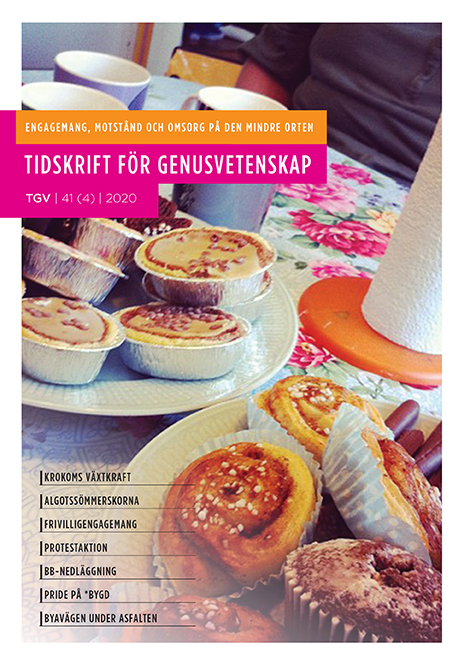”Vi gör det på vårat sätt”. Pride på *bygd, av-urbanisering och de-centrering av hbtq-frågor
DOI:
https://doi.org/10.55870/tgv.v41i4.2539Nyckelord:
Pridefestivaler, *bygd, sverige, paradoxalt rum, av-urbanisering, lokalisering, familjarisering, disidentifikation, urbannormativitet, metronormativitetAbstract
Research on Pride festivals highlight the ambivalent meanings of Pride today. While debates about Pride have illuminated a variety of important issues they tend to be located in urban contexts and the effects of urban normativity is absent in these debates. This article explores LGBTQ activism in a rural setting in Sweden with a point of departure in ethnographic material from a fieldwork conducted at a Pride festival organized in 2015. In the material Pride was situated at the crossroads of metropolitan conceptualizations of Pride and specific conditions relating to rural spaces. This intersection presented Pride organizers with different challenges that they reflected and acted upon when organizing a festival. Organizers described local expectations of their festival resembling Stockholm Pride, and emphasized the difficulty of designing their festival with Stockholm Pride as both model and antitype, pointing out the different conditions facing urban and rural Pride festivals. Wanting to counter the urban image and take local conditions and what was needed in the region as a point of departure they expressed how they wanted to do the festival their “own way.” This article takes this notion of “doing it our own way” as a starting point. Doing it their own way meant de-urbanizing Pride by localizing and familiarizing the festival. The rural Pride festival represented a “paradoxical space” (Rose 1993) where LGBTQ activism and Pride were de/ constructed and re-worked. When adapting Pride to the everyday realities of rural life the festival became a space focusing on different subjects relevant to the region and a space in which metropolitan conceptualizations of LGBTQ struggles and Pride were challenged. By de-urbanizing Pride the festival became less normatively urban, but also less LGBTQ centered.
Nedladdningar
Downloads
Publicerad
Referera så här
Nummer
Sektion
Licens
Författaren/författarna behåller copyright till verket.





